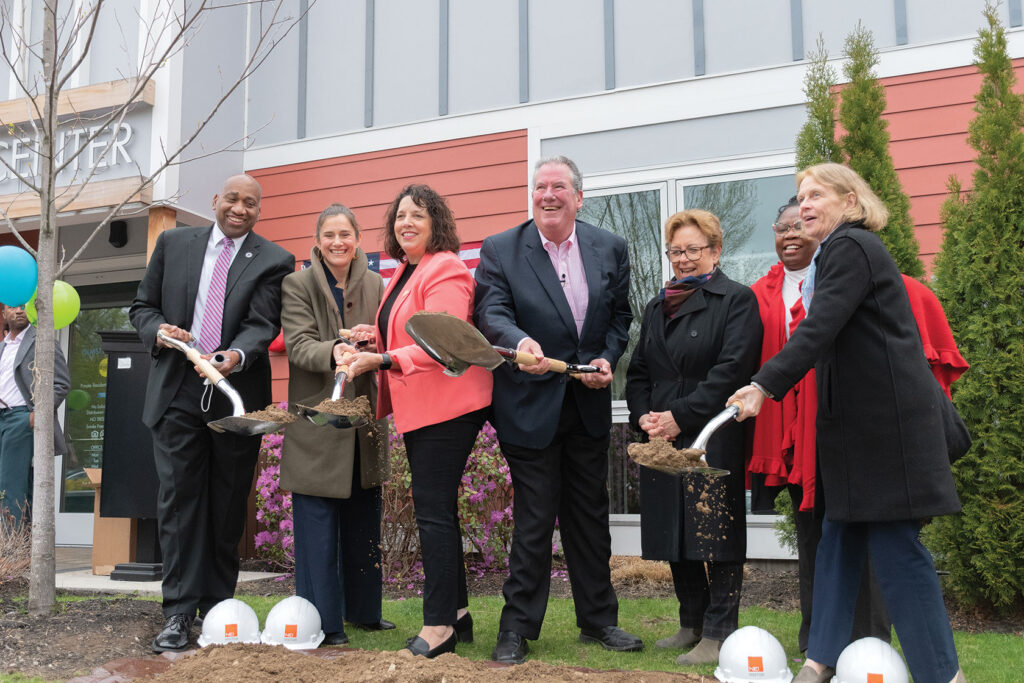
When officials broke ground at The Preserve at Olmsted Green, a development focused on affordable home ownership in Mattapan, it marked the official start of the second project statewide to use American Rescue Plan Act (ARPA) funding through MassHousing’s CommonWealth Builder Program.
The CommonWealth Builder Program, started in 2019, was designed to use $60 million to fund developments in gateway cities and Boston to start to address the racial homeownership gap in Massachusetts. In 2021, the state legislature allocated an additional $115 million to the program using federal funds from ARPA, one of the COVID-19 rescue packages passed by Congress in 2021.
“It is an extraordinary tool to address the really horrific homeownership rate of Black and Brown people [in Massachusetts],” said Jerry Rappaport Jr., founder of the New Boston Fund, one of the organizations behind the development at Olmsted Green, where the groundbreaking took place April 26. Rappaport said The Preserve got about $7.7 million from the CommonWealth Builder Program, a little less than 5% of the project’s funding.
The inclusion of ARPA funds has allowed the program to expand its reach and engage with more developers, said Mark Teden, vice president of multifamily programs at MassHousing. The initiative’s original $60 million was a one-time allocation.
With the added federal funds, developers who might have otherwise not engaged with the program out of concern that there wouldn’t be funding were more willing to work with MassHousing.
“Nobody’s going to [go through the lengthy permitting process] if they think there won’t be funding for the project,” Teden said. “Even the promise of the additional money allowed us to speak to developers who would then really proceed with the project.”
Symone Crawford, executive director at the Massachusetts Affordable Housing Alliance, a nonprofit focused on homeownership, said the addition of ARPA funds to the CommonWealth Builder Program and other initiatives has allowed the state to better address the housing crisis it is facing.
“I’ve been clamoring for more affordable homeownership opportunities to be built in the city and across the state and funding has been the fundamental reason why nothing has happened,” Crawford said. “The ARPA money being funneled into programs like the CommonWealth Builder (Program) to try and increase supply across the state … I think is a good thing.”
The ARPA funding comes with a pair of federally established deadlines. The funds must be obligated by the end of 2024 and spent by the end of 2026. To meet those deadlines, Teden said MassHousing has been applying ARPA funds to deals that were already in the pipeline.
Teden said that MassHousing plans to use all the available ARPA funds and is working to modify the program to expend funds faster.
“We do feel pressure to move the money, but we’re committed to moving it so we don’t have to give it back,” Teden said.
In the spending bill that set aside the $115 million in ARPA funds, state legislators allocated another $480 million to housing efforts across the state, including public housing maintenance, homeownership opportunities for first-time homebuyers and production of housing for seniors and veterans.
Since its inception, the CommonWealth Builder Program has had a three-pronged approach to its work, Teden said. The program aims to produce homeownership opportunities in response to the state’s housing crisis, address the racial homeownership gap and create homeownership opportunities that allow homeowners to generate wealth.
Crawford of the Affordable Housing Alliance said it is important to be aware of the racial homeownership gap, as owning a home is a major way of generating wealth for a household.
“Homeownership is one of the biggest and most fundamental ways that generational and intergenerational wealth is created,” she said. “It’s not the only thing, but it’s one of the most significant things, so if we are not developing programs and services and innovative ideas … to really mitigate and close that racial wealth gap for homeownership, then we are nowhere near solving this crisis that we have.”
According to a 2019 report from the Massachusetts Department of Housing and Community Development, the state’s white households own homes at double the rate of other racial and ethnic groups.
Crawford said the CommonWealth Builder Program does well at what it is meant to do, but only fills one niche in a broader landscape of housing needs.
“The CommonWealth Builder Program wasn’t made to solve all of the problems; it is just one of the tools in the toolbox,” she said. “We need to think through zoning laws, we need to think to the transfer tax, we need to think through other means to make sure that homeownership and rental opportunities are built in every community so that people have a choice.”
In Mattapan, at Olmstead Green, the new development at The Preserve will create 80 mixed-income condominiums, 63 of which will be for affordable to moderate-income first-time homebuyers. It is the final phase of development in a project that started in 2006 on the former site of the old Boston State Hospital and is expected to be completed in 2024. In addition to the new units at The Preserve, Olmsted Green already is made up of about 350 mixed-income rental units and homes for purchase.
The Preserve at Olmsted Green is the second project statewide to use CommonWealth Builder Program funding after the addition of the ARPA funds, following a 62-unit development in Chelsea.






